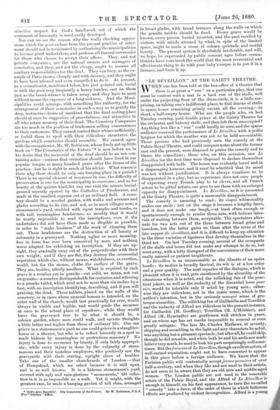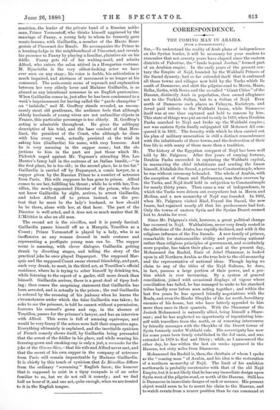"LE RVEILLON " AT THE GAIETY THEATRE.
WHEN one has been told at the box-office of a theatre that there is so great a " run" on a particular play, that one must be content with a seat in a back row of the stalls, well under the projecting floor of the dress-circle, it is a little sur- prising, on taking one's indifferent place, to find dozens of stalls to spare, boxes remaining grimly vacant all the evening,—in short, a half-empty house. Who are the people who, on last Tuesday evening, paid double prices at the Gaiety Theatre for the orchestra and balcony stalls, and then left them unoccupied? Anything less like a " run " could hardly be seen, and the sparse audience received the performance of Le Reveillon with a polite languor for which the weather was not to be held accountable. Those persons who had previously seen the comedy at the Palais-Royal Theatre, and could compare notes about the former cast and the present, were disposed to praise the comedy and to blame the comedians; those who, on this occasion, saw Le Reveillon for the first time were disposed to declare themselves disappointed with both. The house was evidently bored and in a disparaging humour, and it must be admitted that its mood was not without justification. It is always vexatious to be disappointed in a play, but as experience does not cure people of expecting every French play to be clever, and all French actors to be gifted artists, one goes to see them with an enlarged capacity for disappointment. Le Reveillon, as it is presented at the Gaiety Theatre, is quite a memorable disappointment.
The comedy is amusing to read ; its risque whimsicality makes one smile ; but on the stage it becomes a lengthy farce, and it does not make one laugh,—at least often enough or spontaneously enough to render three acts, with tedious inter- vals of waiting between them, acceptable. The spectators alter- nate for two acts out of the three between broad grins and boredom, but the latter gains on them after the scene of the late supper (le reveillon), and it is difficult to keep up attention to the three varieties of tipsiness that develop themselves in the third act. On last Tuesday evening, several of the occupants of the stalls and boxes did not make any attempt to do so, but went away, with a lofty disregard of the convenience of their more easily amused or patient neighbours.
Le Reveillon is as unreasonable as the libretto of an op6ra bouffe ; its motive is broadly farcical, its wit is of a low order and a poor quality. The neat repartee of the dialogue, which is pleasant when it is read, gets smothered by the absurdity of the situations when it is acted, and the rollicking fun of the prac- tical jokers, as well as the audacity of the discarded lover pour rire, would be tolerable only if acted by young men; other- wise they are ridiculous, not in the comic sense, which is the author's intention, but in the seriously manqué sense of gro- tesque absurdity. The rollicking fun of Gaillardin and Tourillon and the audacity of Alfred are ridiculous in the presentinstance, for Gaillardin (M. Geoffroy), Tourillon (M. L'Heritier), and Alfred (M. Hyacinthe) are gentlemen well stricken in years, and on whom age has set marks impossible to conceal or even greatly mitigate. The late Mr. Charles Mathews, at seventy, skipping and mumbling in the light and airy characters he acted, was anything but a pleasant spectacle; but after all,he could skip, though he did mumble, and when both he and his audience made believe very much, he used to look his part surprisingly well some- times. But the farceurs of Le Reveillon, though excellent actors, of well-earned reputation, ought not to have consented to appear in this piece before a foreign audience. We know that the Parisian public will contentedly accept jeunes premiers of over half-a-century, and when they like and are used to their artists, do not seem to be aware that they are old men and middle-aged women. The London public are not used to the venerable actors of the Palais Royal, and the Alfred of Le ..BireilIGn is enough in himself, on his first appearance, to turn the so-called " comedy " into a farce, of the order of those in which ludicrous effects are produced by violent incongruities. Alfred is a young
musician, the leader of the private band of a Russian noble- man, Prince Yermontoff, who thinks himself aggrieved by the marriage of Fanny, a young lady to whom he formerly gave music-lessons, with Gaillardin, a member of the Haute Bour- geoisie of Pincornet des Bcaufs. He accompanies the Prince to a hunting-lodge in the neighbourhood of Pincornet, and reveals his presence to Fanny by playing a familiar, plaintive air on his fiddle. Fanny gets rid of her waiting-maid, and admits Alfred, who enters the salon attired in a Hungarian costume. M. Hyacinthe is the very oldest-looking actor we have ever seen on any stage ; his voice is feeble, his articulation is much impaired, and alertness of movement is no longer at his -command. The serio-comic scene of reproach and explanation 'between her very elderly lover and Madame Gaillardin, is as absurd as any intentional nonsense in an English pantomime. When Gaillardin comes in, just after he has been condemned to a week's imprisonment for having called the "garde champetre " an " imbecile," and M. Geoffroy stands revealed, an uncom- monly stout old gentleman, the audience feels that although elderly husbands of young wives are not unfamiliar objects in France, this particular personage is too elderly. M. Geoffroy's acting is admirable throughout. He gives the soliloquy descriptive of his trial, and the base conduct of that Mon- linot, the president of the Court, who although he dines with him every week, actually persisted at the trial in - asking him (Gaillardin) his name, with easy humour. And he is very amusing in the supper scene ; but the ob- jections to him in the part are just those which Mr. Pickwick urged against Mr. Tupman's attending Mrs. Leo Bunter's fancy ball in the costume of an Italian bandit,—" in the first place, he is too old ; in the second place, he is too fat." Gaillardin is carried off by Duparquet, a comic lawyer, to a .supper given by the Russian Prince to a number of actresses from Paris. His wife supposes he has gone to prison. Alfred .comes to see her, fulfilling his threat ; while he is with her, Ton- rillon, the newly-appointed Director of the prison, who does not know Gaillardin by sight, arrives, to arrest Gaillardin, end takes Alfred off to prison instead, on the pre- text that he must be the lady's husband, or how should he be there, alone with her, at that hour. The part of the Director is well acted, and it does not so much matter that M. L'Heritier is also an old man.
The second act is the reveillon, and it is purely farcical. Gaillardin passes himself off as a Marquis, Tourillon as a Count; Prince Yermontoff is played by a lady, who is as inoffensive as any woman dressed in male costume and representing a profligate young man can be. The supper scene is amusing, with clever dialogue, Gaillardin getting drunk by diverting stages, and telling the story of the practical joke he once played Duparquet. The supposed Mar- quis and the supposed Count swear eternal friendship, and part, each very drunk, to meet, in the tbird act, at Tourillon's official residence, where he is trying to sober himself by drinking tea, while listening to the report of a gaoler, still more drunk than himself. Gaillardin arrives, there is a great deal of tipsy fool- ing; then comes the surprising statement that Gaillardin has been arrested, and is actually in the prison ; the real Gaillardin is sobered by the arousing of his jealousy when he learns the circumstances under which the false Gaillardin was taken ; he asks to see the prisoner, is told he cannot without a permission, borrows his counsel's gown and cap, in the absence of Tonrillon, passes for the prisoner's lawyer, and has an interview with Alfred. This scene is fall of amusing equivoque, and would be very funny if the actors were half their respective ages. Everything ultimately is explained, and the inevitable cynicism of French comedy shows itself, by Gaillardin being persuaded that the arrest of the fiddler in his place, and while wearing his aressing-gown and smoking-cap is only ,a jest, a revanche for the joke of the Oiseau-bleu,—that his wife and Alfred never met, and that the secret of his own supper in the company of actresses from Paris will remain impenetrable by Madame Gaillardin. It is chiefly by this touch of cynicism that Le Ilgveillon differs from the ordinary " screaming " English farce; the humour that is supposed to exist in a tipsy escapade is of an order familiar to us, but we do not call it comedy ; and we find half an hour of it, and one act, quite enough, when we are treated to it in the English tongue.



































 Previous page
Previous page